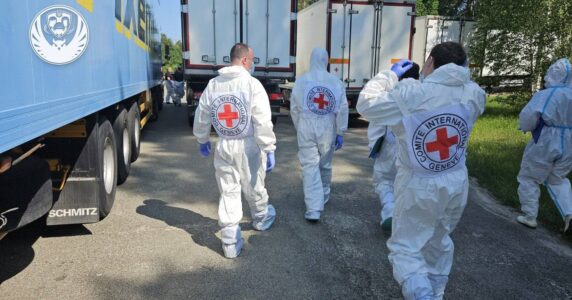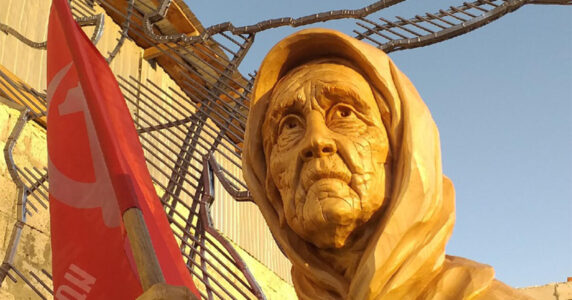Navigation and useful materials
Experts in the field of satellite broadcasting and opposition activists about the fight to stop the spread of Russian disinformation in the world
Against the backdrop of Russia’s continuing war of conquest against Ukraine, six CSOs and more than fifty European activists united under the slogan “Eutelsat, Stop Bloodcasting!” and went to a protest demonstration in front of the headquarters of the satellite company Eutelsat in Issy-les-Moulineaux in the suburbs of Paris in France.
In total, Eutelsat’s “Russian segment” has about 330 TV channels and covers almost 15 million Russian households and millions of viewers in Europe, contractually cooperating with two Russian pay TV platforms, “Tricolor” and “NTV-Plus,” both of which are integrated into Putin’s propaganda and disinformation apparatus.

The demands of activists protesting in France are simple: “Eutelsat, one of the largest international satellite operators, whose main shareholder and regulator is the French state, must stop this cooperation”
The protest was held under the auspices of The Denis Diderot Committee, a project aimed at restoring the free exchange of information in the media and telecommunications, which does not allow the use of any military or other propaganda.
Its founders — Jim Phillipoff (Media Expert, Founder and Former CEO of the Ukrainian satellite platform XTra TV) and André Lange (researcher, expert on European audiovisual issues, former head of department, European Audiovisual Observatory (Council of Europe)) spoke about the goals of the protest in a commentary for the Voice of America Russian service.
“We have condemned what is happening and pointed out to the French and European public that there is no decision of the French and EU authorities to stop cooperation with Russian platforms that relay propaganda channels, which we consider immoral, illegal, as well as absurd from a strategic standpoint,” they stated.

The idea of the action was proposed by Ksenia Yermoshina (Media Resistance Group), a researcher at the French National Centre for Scientific Research of France (CNRS). She was the author of a tough formulation of the slogan of protest (“Eutelsat, Stop Bloodcasting!”) — which calls the money that the channel receives for spreading propaganda of the Russian aggressor bloody.
The protest was organized on the occasion of the presence of Mikhail Klimariov in Paris, executive director of the Russian Internet Protection Society (IPS), currently based in Lithuania.
Mikhail Klimariov, in a comment for the Voice of America Russian Service, stated that, according to his organization, “more than 50,000 Tricolor satellite kits have already been brought to the territories of Ukraine recently occupied by Russia for reception and further dissemination of Russian propaganda channels.”
Eutelsat and the “Dangerous Virus” of the Kremlin’s Criminal Propaganda
Through the Russian pay TV platforms Tricolor and NTV-Plus, which pay Eutelsat tens of millions of euros per year for their distribution, viewers in Europe, Russia, and now the occupied territories of Ukraine get access to the broadcasting of the main Russian channels (Russia-1, Channel One, and NTV), “full” of propaganda.
In addition, 13 other Russian information channels are broadcast via Eutelsat, including RT groups — formerly known as Russia Today — including the Arabic version of RT Arabic for North Africa and the Middle East.

BelRos (a channel of the Union of Russia and Belarus with pro-Russian content of “imperial” orientation), the militaristic TV channel “Zvezda” of the Armed Forces of Russia with openly agitation and disinformation materials, and 33 regional Russian channels, including ChDTRK Grozny controlled by Kadyrov, as well as two channels of the Russian Orthodox Church with anti-LGBT speeches from some of its representatives, are distributed in the same way.
TV channels that “speak” from the Russian-occupied territories of Crimea, Donetsk and Luhansk oblasts are also distributed through Eutelsat.
Attempts to influence Eutelsat are currently insufficient
At the end of September, there were positive developments: the European Commissioner for Transparency, Věra Jourová, who is responsible for media issues in the EU, said during her visit to Ukraine that “further sanctions are possible,” referring to Eutelsat.
On the same day, the European Commissioner for the Internal Market, Thierry Breton, who is responsible for space issues, said in an interview to the press that “cooperation with Russia in space has been terminated.”
However, the eighth package of sanctions against Russia, adopted by the EU in early October, did not prohibit the provision of satellite services to propaganda TV channels.
In this context, André Lange is extremely dissatisfied with the reaction of the official representatives of the European Union to the appeals and petitions of The Denis Diderot Committee and a number of other European CSOs.
The European Commission, when considering complaints, uses the concept of “disinformation.” Russian TV channels contain a lot of disinformation, including denial of the responsibility of the Russian army in the massacres of civilians in Ukraine. Nevertheless, André Lange believes that “the issue is much more serious than just disinformation.”
“These Russian channels regularly broadcast calls for the murder of Ukrainian and European leaders or journalists, and call for the genocide of the Ukrainian people. Speeches by TV presenters often turn out to be more radical than even Putin’s own statements. The channels show footage of forced interviews of prisoners of war. Their journalists express support for the deportations and ‘Russian re-education’ of Ukrainian children, which is also a form of genocide,” André Lange said in an interview with the Voice of America Russian Service.
He insists that “the content of the main Russian channels and Eutelsat’s cooperation with Russian platforms full of propaganda is contrary to the EU Charter of Fundamental Rights.”
“The position of the French authorities is also confusing. In his latest TV interview, President Macron admitted that Russians were waging a hybrid war, including a propaganda war. But the interviewing journalist did not ask why this propaganda is broadcast by a French company that is under the control of the French authorities. Would you imagine that the British government during World War II would allow broadcasting capacity to be put at the disposal of the Großdeutscher Rundfunk?” André Lange asked indignantly, referring to a radio broadcaster of the Nazi Germany.
Eutelsat itself refuses to negotiate so far
“They refused to meet and did not answer our questions concerning the Eutelsat 53 A satellite which broadcasts to the territories of Ukraine illegally annexed by Russia. They repeatedly told the press that they are bound by their ‘Code of Ethics,’ which prohibits them from interfering in the content of their clients and obliges them to maintain neutrality,” commented André Lange.
Voice of America has previously covered the attempts of the Denis Diderot Committee to start negotiations with Eutelsat.
“We understand that they feel protected by the French government,” added André Lange bitterly.
Eutelsat published its financial results for Q1 this week.

“It did not mention Russia. We don’t know if they are being paid by Russian partners now, and it appears that none of the journalists are investigating this,” Lange clarified.
European society is not indifferent, but more effort is needed
In early October, a debate on Ukraine was organized in the National Assembly of France, where a group of French MPs presented a proposal for a resolution with “a request to the French government, Arcom, the EU and the intergovernmental satellite organization to take measures to stop the broadcasting of TV channels associated with the Russian authorities on Eutelsat satellites.”
The National Council of Ukraine on Television and Radio Broadcasting regularly reports on its website about the work of the Denis Diderot Committee.
Opera singer, former member of the State Duma of the Russian Federation, who lives in Ukraine, Maria Maksakova cites petitions of the Denis Diderot Committee in her videos on YouTube, bringing in hundreds of new signatures within several hours.
“We also have private support from numerous European civil servants who are well aware of this case, but who cannot, due to ‘obvious reticence’, make their personal position public,” emphasized Lange.
The Committee’s actions are covered by the European press — Frankfurter Allgemeine in Germany and Berlingske in Denmark, the country of origin of Eutelsat CEO Eve Berneke.
Representatives of Reporters without Borders, Russie-Liberté, Union des Ukrainiens de France and Pour l’Ukraine, leur liberté et la nôtre, as well as Feminist Anti-War Resistance and Pemanagpo have participated in the protest action organized by the Denis Diderot Committee.
Sanctions against TV propaganda should become tougher
In May, the U.S. Treasury Department’s Office of Foreign Assets Control (OFAC) banned U.S. satellite companies Intelsat and Horizon Satellite Systems from continuing to broadcast three Russian state-owned channels on Russian pay TV platform Telekarta. The decision was quickly implemented and forced Telekarta to transfer its offer to Russian satellites.
At the beginning of March, the EU banned the broadcasting of Russia Today versions in various languages (except Arabic RT) to the EU market. In June, they banned three more Russian state channels.
Arcom (the French regulator) banned Eutelsat from broadcasting NTV Mir to EU countries in July. The broadcasting regulators of Poland, the Baltic countries and Ukraine have banned the distribution of a number of Russian TV channels in their countries. Since there is a gray market for Tricolor decoders in the Baltic countries, the Latvian parliament passed a law prohibiting the use of Russian decoders.
The governments of the EU, the US, the UK, Canada and Australia have also imposed sanctions against individual Russian TV journalists and against the former CEO of Yandex, the “Russian Google” (based in the Netherlands).
“However, we believe that sanctions against individuals are purely symbolic and Putin’s propagandists even brag about them in public. These sanctions did not prevent Vladimir Solovyov from giving an interview as a guest star at the Italian RAI talk show,” emphasized André Lange.
The ban on RT programs is being enforced, but the Denis Diderot Committee has learned that RT France has been rebooted and is even broadcast by Luxembourg’s IPTV network.
EU sanctions against Russia Today, for example, apply only to the EU market and not to broadcasting aimed at third countries.
“Think what the same regulation of the arms trade would be like: you regulate trade in the EU market, but allow arms dealers to supply arms to any dictatorial, bellicose government or terrorist organization elsewhere?” asks André Lange.
A representative of the Internet Defence Society told the Russian service of “Voice of America” that he “intends, together with other opposition organizations, to seek the inclusion of the CEO of Eutelsat, Eva Berneke, in the list of aids of the Putin regime.”
There is an alternative to two Russian platforms for Eutelsat
Jim Phillipoff, the other cofounder of the Denis Diderot Committee, suggested in a commentary for the VOA Russia Service that Eutelsat’s losses if they refused to rebroadcast Russian propaganda channels could be compensated.
“Our general concept is that Russian opposition channels, as well as international Russian-language channels such as “Nastoyashcheye Vremya/Radio Liberty” Russian-language services from YLE or Estonian TV, and possibly even Ukrainian Russian-language channels, will replace the propagandist Russian channels. I believe that if position 36E became available, many such channels would want to use it. Euronews has a Russian-language version, and, of course, Dozhd, which now broadcasts from the EU. Previously, there was a lot of Russian content on Ukrainian channels, and it probably wouldn’t be difficult to translate one or more Ukrainian news channels into Russian,” concluded Jim Phillipoff.
Stan Prybylov, Voice of America
English translation – Centre for Strategic Communication and Information Security
If you have found a spelling error, please, notify us by selecting that text and pressing Ctrl+Enter.


